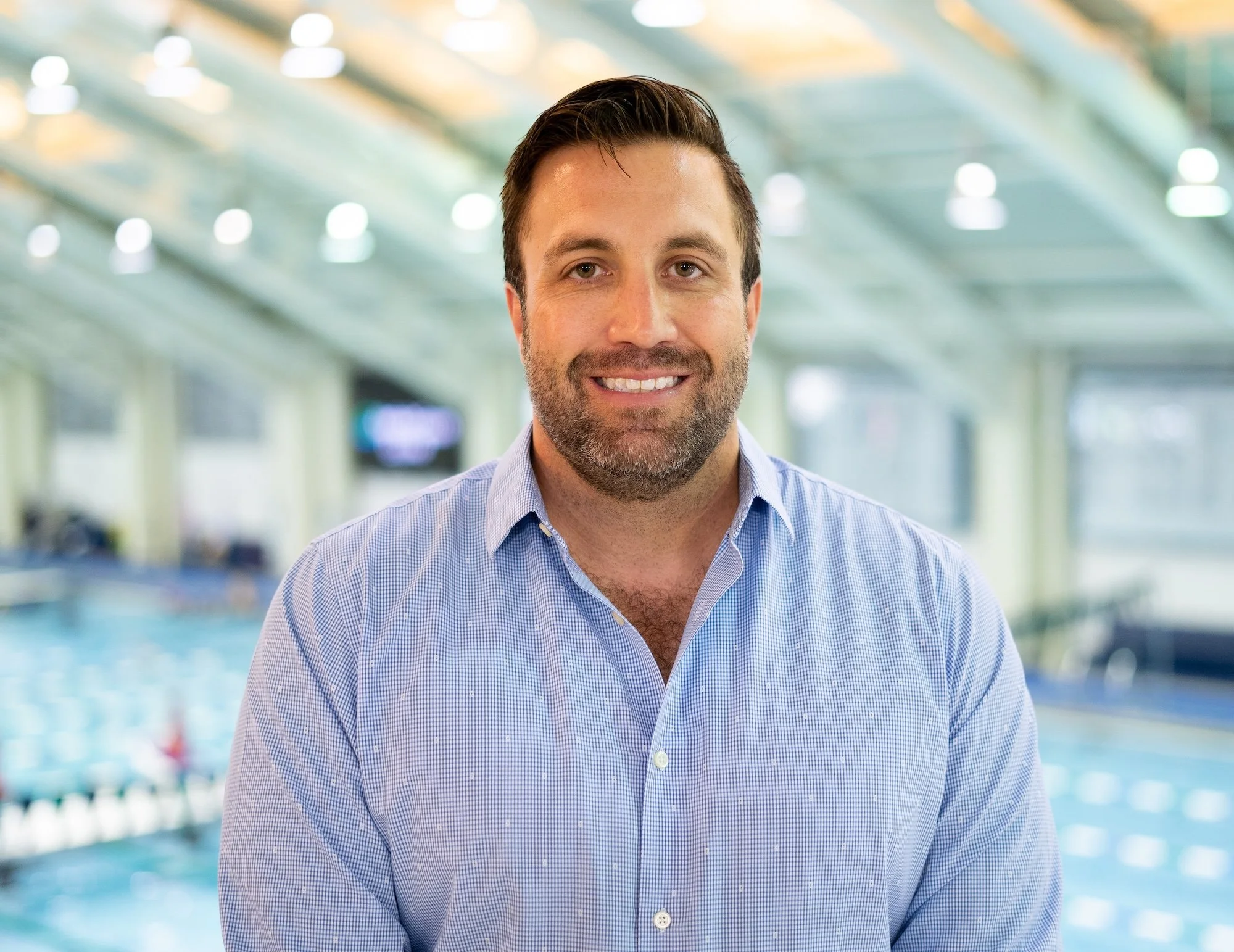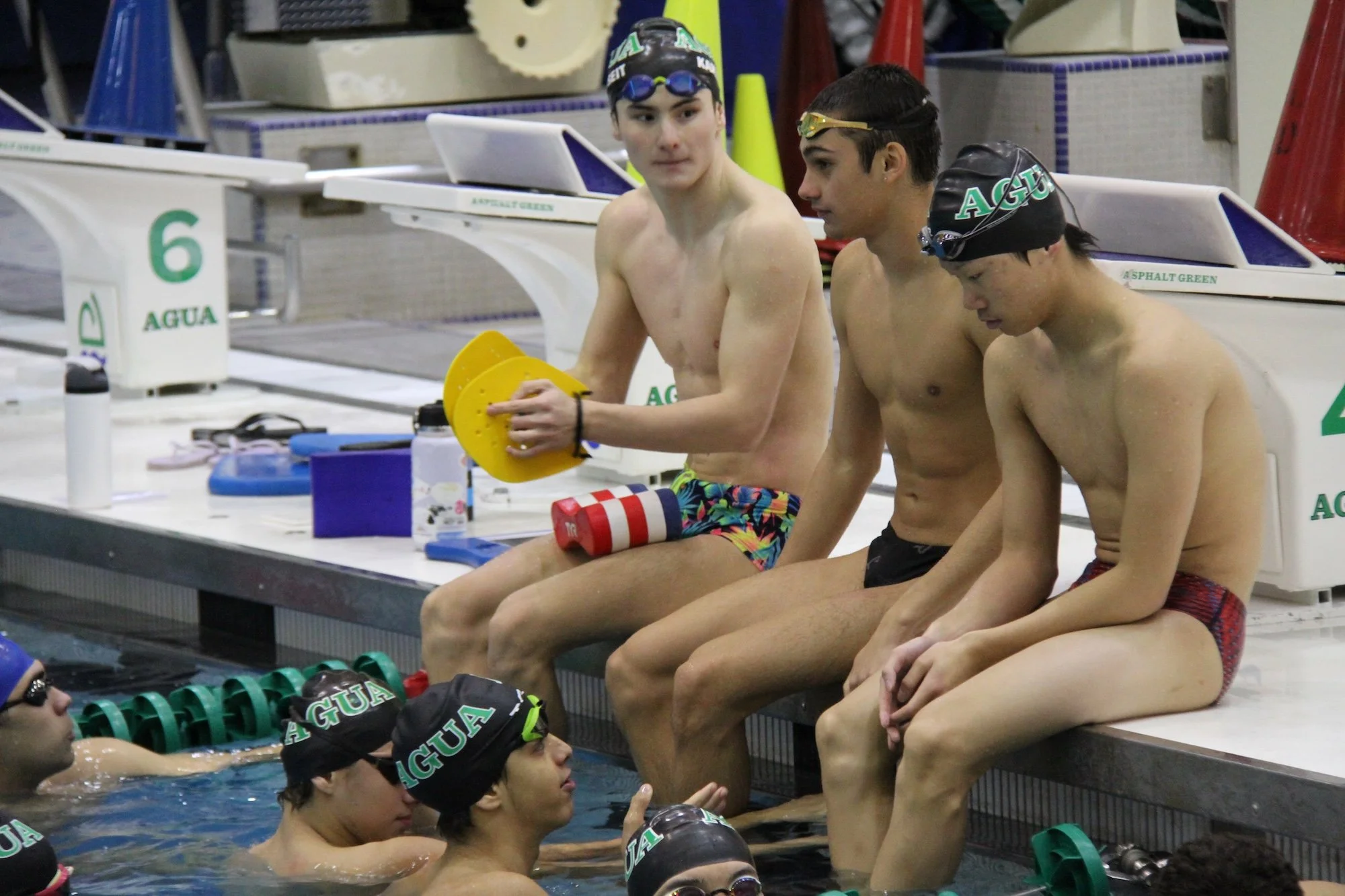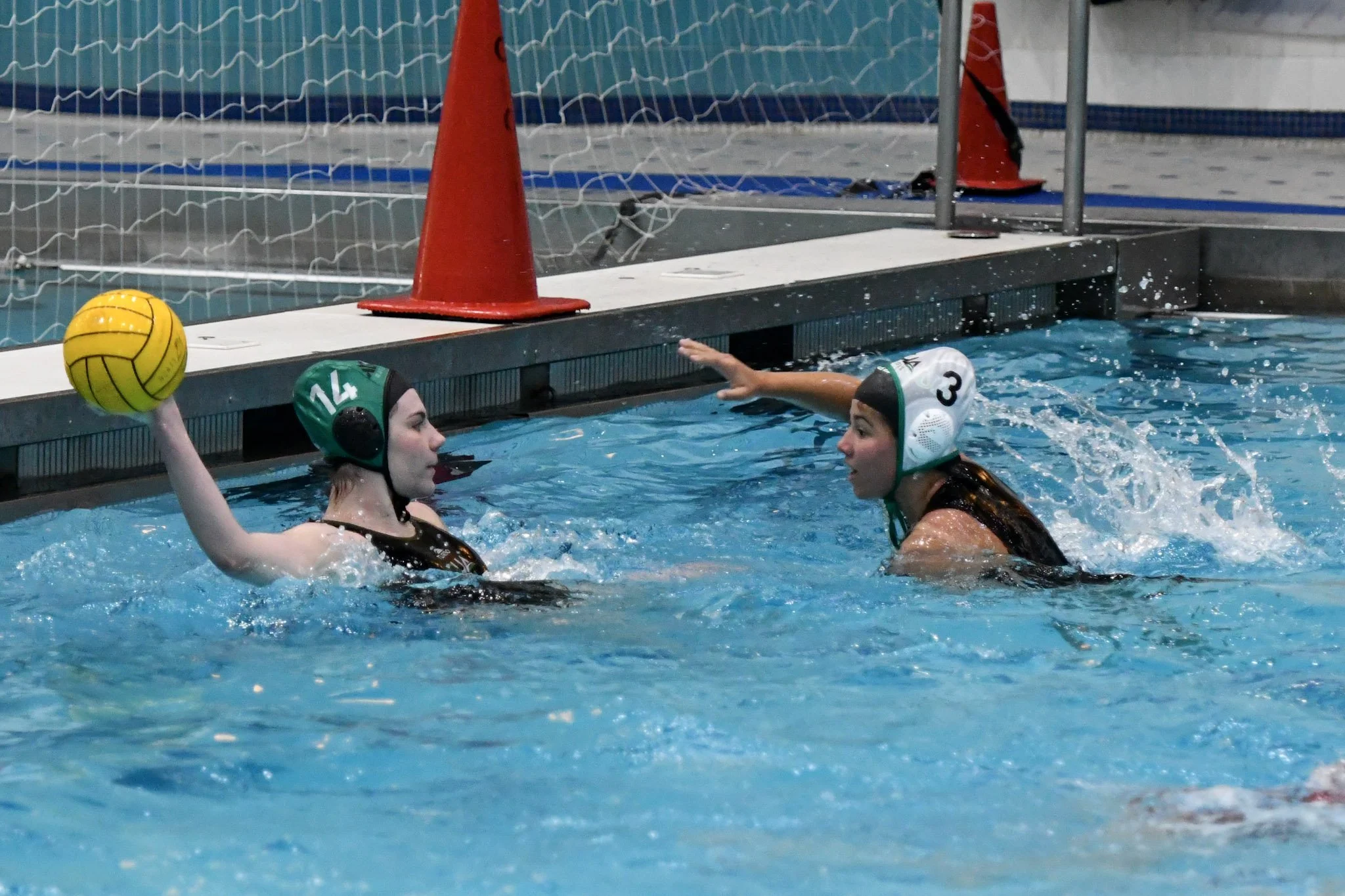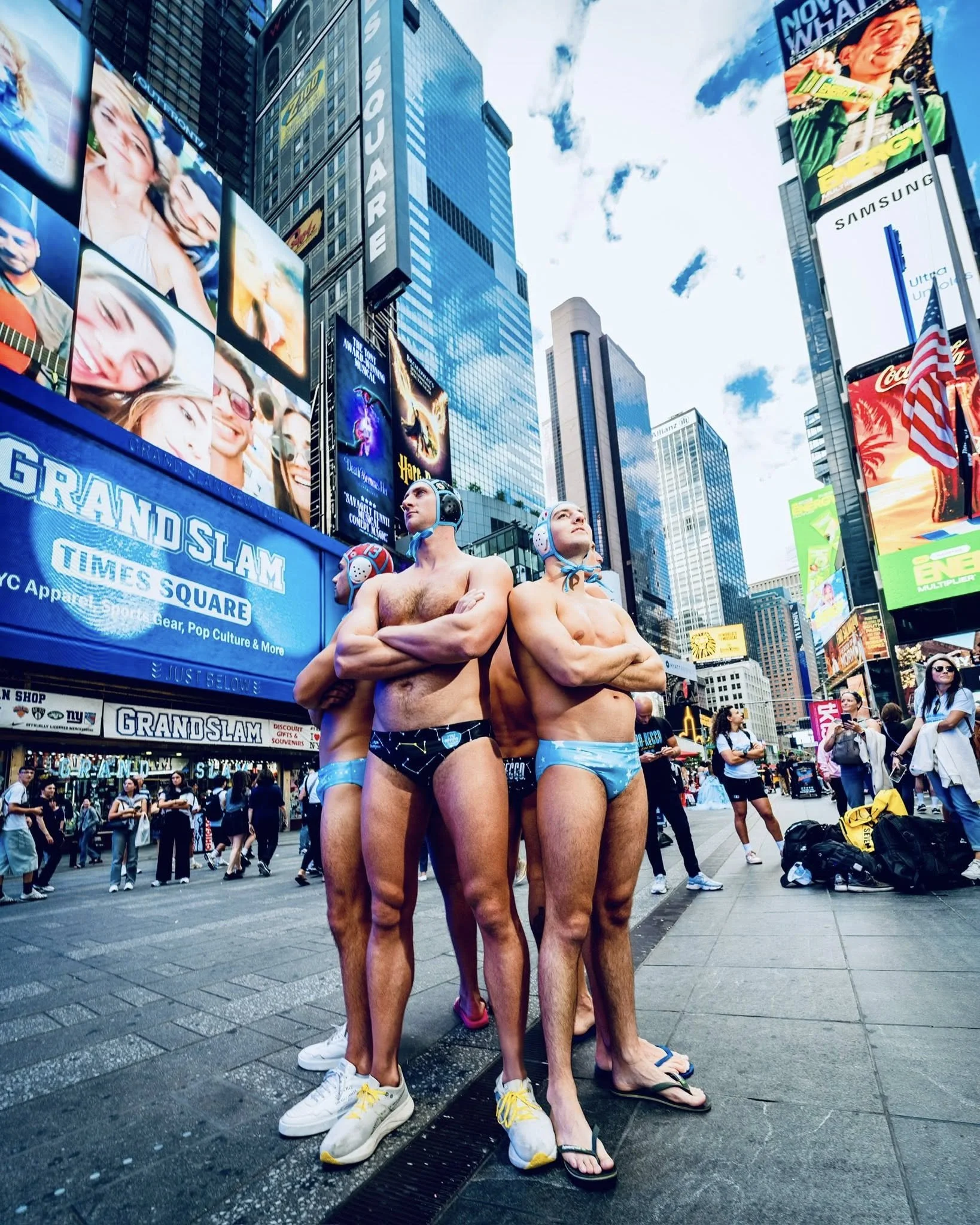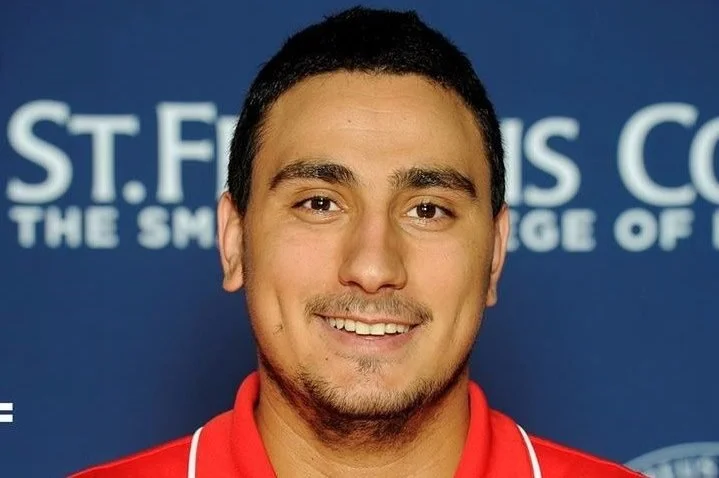Asphalt Green’s David Rodriguez: The Time is NOW for AG Water Polo
Asphalt Green Unified Aquatics (AGUA) Head Coach David Rodriguez. Photo: Asphalt Green
NEW YORK CITY, NY. On Wednesday night history will be made at Asphalt Green on New York City’s Upper East Side. Two professional water polo clubs—Italy’s Pro Recco, whose 11 Champions League titles make it the world’s top club, and Ferencvaros of Hungary, winner of the last two Champions League titles—will face American college teams, the first time such matches have ever taken place in The Big Apple.
On Thursday night Pro Recco and Ferencvaros will face off in a friendly match.
That this should happen in the city’s premiere aquatic facility is as it should be. Ever since the venerable swimming and fitness center opened its doors in 1984, Asphalt Green has been the go-to location for New York City’s best swimming.
When UCLA, currently the top squad in the Collegiate Water Polo Association (CWPA) Men’s varsity poll, faces Pro Recco, the stands will be packed with polo fans from around the region. The nightcap features Princeton, the Garden State’s prized polo squad, playing Ferencvaros, whose squad has never been to NYC, unlike their Italian rivals who in 2002 played an exhibition against the US men’s national team. Which just happens to be the last time a water polo event of any magnitude occurred in the country’s media capital.
It’s no coincidence that at this moment David Rodriguez, longest-tenured head swim coach in Asphalt Green’s history, is thinking big about polo. When Pro Recco owners Philip Hammarskjold and Alex Behring dreamed a year ago of a splash for their newly acquired club, they thought of NYC. Which brought them to Rodriguez and his plans to make polo more than something locals think about at Olympic times—or once every four years.
The following interview has been edited for brevity and clarity.
****
[Michael Randazzo] You're one of the longest-tenured coaches currently at Asphalt Green. And in 12 years there's been lots of progress and change. How has that experience been? What are the things that have impressed you? What's changed?
[David Rodriguez] To clarify what we’re talking about as the longest tenured AGUA (Asphalt Green Unified Aquatics) head coach, I'm unsure of data for the rest of the sports teams, but AGUA head coach for sure.
AGUA swimmers. Photo: Asphalt Green
A unique thing about Asphalt Green, and one of the reasons that it keeps me here year in and year out—12 years in one spot is a long time, especially for a coach at my level—it's so much bigger than just the competitive team.
Our mission is transforming lives and building community through sports fitness and play for all. That is at the core of what keeps me around; the ability to drive expansion in our waterproofing, in our WaveMakers initiative and our safe swim NYC.
Asphalt Green is the ultimate public private entity for aquatics in New York City, and a model throughout the country. You have a competitive swim team, you have competitive water polo, you have Masters Swim, but you also have a mission, which is to teach everyday New Yorkers including kids to swim. How does that all get folded in?
That's one of our main focuses and goals is that concept of “for all” that idea of whether it's to learn how to swim, to feel safer, to be a lifeguard, to be a competitive swimmer, to be a water polo player, just to have the opportunity to stay fit throughout your life.
Over the last 12 years I've seen a ton of growth in the impact we're able to [do]. The balancing act—making sure that everybody gets what they need—is art meets science. Trying to understand what specifically each constituency needs and how do we fit that in the pie that is our pool grid, our pool space.
There’re many competing forces, Asphalt Green, a nonprofit with a very clear mission, to get as many people as possible in the water. On the flip side is the organization’s different constituencies—and now you are considering expanding water polo—and what that means to pool usage and your clientele.
But there's always going to be tension between the Upper East Sider or who pays a hefty a membership fee to swim laps versus the young swimmer who needs the opportunity to develop their skills and grow into the next Lia Neal. How do you deal with all these constituencies and find ways be diplomatic, keep as many people as possible happy.
I say it a little bit tongue in cheek, but the reality is that if you ask each of the constituencies, they'd all be mad at me and all be wanting more.
And I think that that's when the lens that we use on all of this is through our mission… the concept of sports, fitness and play for all.
How do we chop it up? That’s a challenge! For our competitive team, we all have to make compromises on pool time. Our water polo program, if they had more pool time would be better.
Asphalt Green’s flagship location on NYC’s Upper East Side. Photo: Asphalt Green
One of the blessings in disguise of all this is that our athletes on AGUA and ultimately water polo learn that [aquatics] is about something so much bigger than just their competitive teams. And the ability to provide access and to give opportunities that they have is at the core of what we're teaching the kids. We're teaching the kids to be advocates and better citizens and do things when they leave our program.
One of our athletes, Ali Wright, recently took the initiative and raised over $70,000 by herself to support our community programs. If we keep everything separate—only competitive teams here in this pool or community swimmers there—they'd never see that.
What some see as a challenge, I see as a blessing. People [can] see that whole ecosystem of all things possible in the same way that a lot of our membership have become fans of our athletes. They understand what it takes to accomplish what [AGUA does].
I don't think we perfected it, but I think that we found a good balance between having everybody cheerlead all the things that we're doing [while] giving everybody what they need.
When we spoke in 2017 you predicted you would become a top 25 program in the USA—and you did it! Now you've raised your own expectations, which is if you're in the top 25, what’s next? And, going back to the finite resource, which is pool time, how do you keep developing, promoting and ultimately improving, especially with your competitive programs?
No, and I think that when I made that statement in 2017, I was probably a bit green behind the ears and very, very ambitious. In 2021 we were in the USA Swimming club excellence program and were named a Gold Medal Club in 2021, which signifies that we're one of the top 20 teams in the country.
Since then, we've consistently maintained our status in the top 20 through the virtual club championships, which is a measurement of the entire club. Happy to say: Mission accomplished.
How we achieve that… two things, One, Asphalt Green is attempting to become the model, if [we/re] not already there, of how excellence and inclusion can coexist. We've had incredible support from [the organization] in maintaining our staff. Some of my assistants are going into their 10th season. They own the program as much as I do. I've given them a platform to grow and develop into great coaches. Most recently Hailey Hewitt was named one of the top age group coaches in the country.
This year one of my other assistant coaches, John Alaimo, is a top five finalists for that same category.
The ability to develop coaches and work with them has been a big key to [our success]. And what we were talking about earlier, when you have less time than your counterparts, you become more efficient with that time. We've leaned into the science, leaned into our strength and conditioning, focusing on sleep quality, nutrition, hydration, to maximize the time that we have in the pool.
We've been able to maintain our national standing despite that. That’s a tribute to the staff but also attribute to the organization for supporting us to maintain that staff. Because as your successful coaches want to grow.
Being able to keep that continuity is big for us.
As you continue to raise your goals and ambition, how does Asphalt Green become a model for other like-minded aquatic organizations? What we all need is to have real outcomes, to have success, to not just get people in the water and be safe, but to carry that through and see a transformation.
Through our WaveMaker initiative, a lot of our focus is how do we create data sets and information that allow us to understand what model of instruction is most efficient, most successful and most scalable. Our focus from that perspective is to crack that code.
AGUA youth polo. Photo: Asphalt Green
We're working on what I've envisioned as the next step or the evolution, bridge programming that connects some of our community, some of our Wavemakers participants or our Waterproofing participants, to that next tier of instruction or access. That will allow them pathways to our competitive team or our competitive water polo team.
We also work on developing lifeguards. Showing that we can take advantage of [our] base of athletes that we work with and expand and give them these pathways—so they can progress however they want in their aquatics journey or vision. Showing that we can put people on the Olympic block and making it all work together is the standard we're trying to set as a model for the rest of the country or other aquatic organization.
I think in that same vein of being a model of excellence and inclusion working together.
Asphalt Green has an opportunity with water polo—next week Pro Recco and Ferencvaros will play one of the highest profile polo matches in NYC history. There's often a split between swim people and water polo people. As the aquatic director, you're overseeing different programs with natural rivalries.
Having an elite swim program and elite water polo program under the same umbrella is another piece we're trying to achieve. My background is as competitive swimmer; through and through that was my passion. But I was exposed to water polo and played water polo throughout my high school career with some great water polo coaches—and grew a lot of fandom for the sport itself and working together being a useful tool for kids to parlay into their professional lives.
When we spoke eight years ago, I wasn't thinking water polo. But post pandemic we had an opportunity to start a water polo program; take advantage of that finite resource we call the pool.
Through careful leadership [AG water polo] has evolved into a respectable program. What if we were to put our foot on the gas and try to become an elite program; would we be more than middle tier?
The combination of our coaches, my competitive nature and AG’s focus on the sports fitness and play for all we've decided to put our foot on the gas and see if we can get a water polo program that can hold up to what we've done from a swimming perspective.
What Pro Recco does best: win Champions League titles (2023). Photo: Federico Schenone
All signs from that perspective point to yes; we're excited to grow not only swimming but also water polo in the City of New York.
You have two of the best teams in the professional world of water polo from Europe coming to your pool in a week from now. How will this help jumpstart what you might want to do with youth water polo?
Again, looking back at our mission and what we're about, I thought a lot about how in swimming, we talk about the Olympic bump [from] after the Olympics is on TV for 10 days of swimming every night. Then people that are [watching] on their couches are like: I want to be Katie Ledecky, I want to be Michael Phelps. I thought this [event] is such a rare opportunity for New York kids of and the kids of our water polo program and the fans of the sport to see it [polo] at the highest level, live.
Princeton Coach Dustin Litvak and team, 2025 NCAA quarterfinalists. Photo: Princeton Athletics
If you're going to build momentum and excitement towards growing a sport that is actually small in comparison to USA Swimming and in comparison to its impact inside of New York City—even though we have a lot of immigrants from those parts of the world that are into water polo—this could be a shot in the arm and a catalyst to get people excited.
They don’t know that there’s a pro league in Europe. They don’t know there’s a Champions league in the same way that there is in soccer. That exposure along with the opportunity to showcase our world-class facility was something that I was excited about putting together.
We're learning a lot as we go along, but it has created a lot of buzz and excitement around our program and hopefully is a catalyst to grow water polo into this next domestic Olympic quad.
I don't want to undersell the other two teams that will be participating: UCLA, defending national NCAA champions and Princeton is top five in the country with a fantastic facility.
That’s what tipped the scale for me. For a long time on the competitive swimming end, we've been a factory of collegiate development. We put a lot of kids into DI, DIII and the Ivys, and we're starting to do some of that in water polo, too.
I thought: Here are two of the biggest collegiate names in the sport combined with two of the biggest polo giants in the world. Let's get 'em all here in the biggest city in the world and try to put together an event that showcases Asphalt Green and showcases the sport at the highest level. It also teaches our future generation of water polo players and swimmers, the pathways that are both Olympic but also college. Showcasing both of those things in the same light was an opportunity that I couldn't pass up.
It's both a brilliant opportunity to overlap the European and American polo experiences. If you're a European and playing an Olympic sport, you might skip college and pursue it at the professional level because that's a way to financial success, In America it's the opposite. You go to college to play water polo at UCLA Cal, USC and Stanford, it’s a ticket to corporate success.
Speedos in Times Square! Photo: Pro Recco
But let's step backwards because in 2002, Pro Recco played the Americans in your pool. In fact, if you talk to some sort of old time polo watchers that was a great moment for NYC polo.
But it didn't pan out. So how will you capitalize on this great moment that it's going to be gone in an instant? Walk through that sort of progression this high of, oh, all these great players are here and you're meeting the Olympians and the collegiate athletes, and then next week you're back in the pool and what happens.
The way that I've thought about it is, as we've been building momentum towards this event, we've also been building out the infrastructure of the water polo program. We've been building up a staff of coaches over the summer, and we most recently hired a new head coach to take over the program, springboard our program to the next level.
We've had Matthew Guerrero build our program up for the last five years. With the support of some Asphalt Green families and when the excitement lands on the other end of all of this, we'll be able to hopefully build out a robust program, building a strong coaching staff. And we got a lot of gear and stuff coming out of these big games that we're going to use! [laughs]
Capturing that momentum is going to be a big focus of us over the next month after the event.
Kudos to getting Iljia Duretic as your new head coach. I've known Ilia and agree he’s a great choice. He's local guy and he knows what it's going to take to be successful in this marketplace.
Part of the problem I think in the sport is that water polo is perceived as an affluent sport for rich white kids. How do you change that?
Asphalt Green is uniquely built to help knock down those financial barriers. It's something that our swim team and our basketball team and our soccer team, we already have the infrastructure of almost $10 million in free and subsidized programming a year.
Iljia Duretic, new Asphalt Green water polo coach
If there's an athlete that wants to get on an Olympic team [or go] to college—anything to grow in the sport, we're going to find the support to help them out.
On that note, for us, a lot of it has to do with education. We spend a lot of time on the AGUA competitive team with parent education, having them understand how difficult it is to find that pathway to an Ivy or to Stanford.
We talk that the sport can't be about that [it] needs to be about development and growth and application to solve problems. As I like to say, the byproduct of teaching those life skills is the metals or the trophies or the wins.
That's at the core of what we do. We think that this stuff is you can be aspirational, you can be all that, but your focus needs to be on the process of getting better day-to-day. And, in that process of learning how to get better day-to-day is a life skill that they're going to take to the next level for themselves.
That's why, the byproduct is the fast swimming, the medals—but what we're focused on is the process of development. That goes in to developing families in the same way as developing athletes. I think the mistake is to focus on teaching the athlete… and then the other 20 hours of the day they're getting different messages at home.
You're trying to make sure that the messaging is consistent on both sides, that you can put the athlete in the best position to be successful
To finish up, there are rumors out there that Asphalt Green wants more water, that if you could find the land, you’d build another facility. When you think about expanding all the good things you do, it does come down to the finite resource that you currently have, which is your pool space.
We look at this in two ways. It's not only expansion, but also maintenance and preservation of our current landscape as well, which is the two sides of the coin. Right now, we shut down both of our pools for two weeks to refurb/rehab, do all those things to continue to deliver [program] at a high level at our home site. We helped rehab the pool at River East which hadn't been open since 2015. It's not only building on our campus, it's also looking for [aquatic] assets sprinkled across the city—that could potentially work for us and what we're trying to do.
A lot of them were built not at the depth that we need for water polo or swimming, but those are things that we're working around. As an organization, we are leaving no stone unturned in what we can do with our campus.
We're doing due diligence on our research and seeing what's possible on our campuses. We know we are bursting at the seams looking for more pool space and water. If there's an opportunity that makes sense for the organization, I'm confident that we'll jump on it.

